Many of us can remember the reliance our families had on small, independent black businesses during the decades of Jim Crow. It has been said that in that time, a black man’s dollar circulated up to 36 times before leaving his community. Today, that same dollar remains in the black community less than 6 hours. Those blacks who were able to enter business instantly became important figures because of the crucial role they played in daily life.
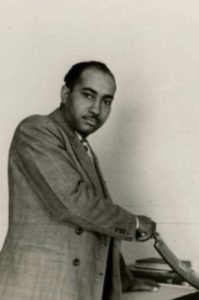
Harold E. Doley, Sr., businessman, educator, civic leader, and Carnival enthusiast.
One such man was Harold Emanuel Doley, Sr. whose extended family had a grocery store in Convent, Louisiana in St. James Parish as well as on Upperline Street in Uptown New Orleans. Born in New Orleans on 13 August 1911 to Adam Doley (1885-1916) and Luttie Miller (1891-1983), Harold was one of four children. When he was only 6 years old, his father was killed tragically in a train wreck while working on the Illinois Central Railroad in Humboldt, Illinois. Harold, his mom and sister Olga moved into the home of Wenceslas and Cecilia (Miller) Doley, his father’s brother (who was married to his mother’s sister), who lived at 2814 Upperline Street and who operated a grocery right next to their home.
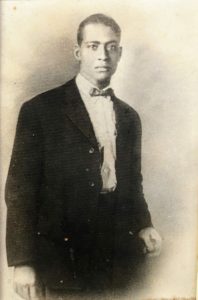
Adam Doley (1885-1916), father of Harold Doley, Sr., and descendant of Mayflower Pilgrim George Soule.
Young Harold attended Willow Street School (later renamed Edgar P. Harney) and graduated in 1928 from McDonogh 35 High School. He continued his education and received a bachelor’s degree in philosophy in 1941 from Xavier University, married the love of his life, Kathryn Wall in 1942; and applied to the zoning board to establish a grocery store in 1944.
Doley’s Grocery and Market was located at 3751 Willow Street at the corner of General Taylor. It was a community/ neighborhood store that provided services we take for granted today. Most of the clients were un-banked, meaning people would work all week and come to the grocery store to pay their grocery bill, which was “on the books,” in effect cashing their check through the grocery.
The store had normal business hours with Saturday being the busiest day of all. Customers would come in droves to pick out their live chickens. Of course, they wanted to have them defeathered and cleaned before they were purchased. To make life easier, Mr. Doley bought a rotational machine that removed the feathers of the chickens! This was big business every Saturday with Thanksgiving being the biggest business day of the year.
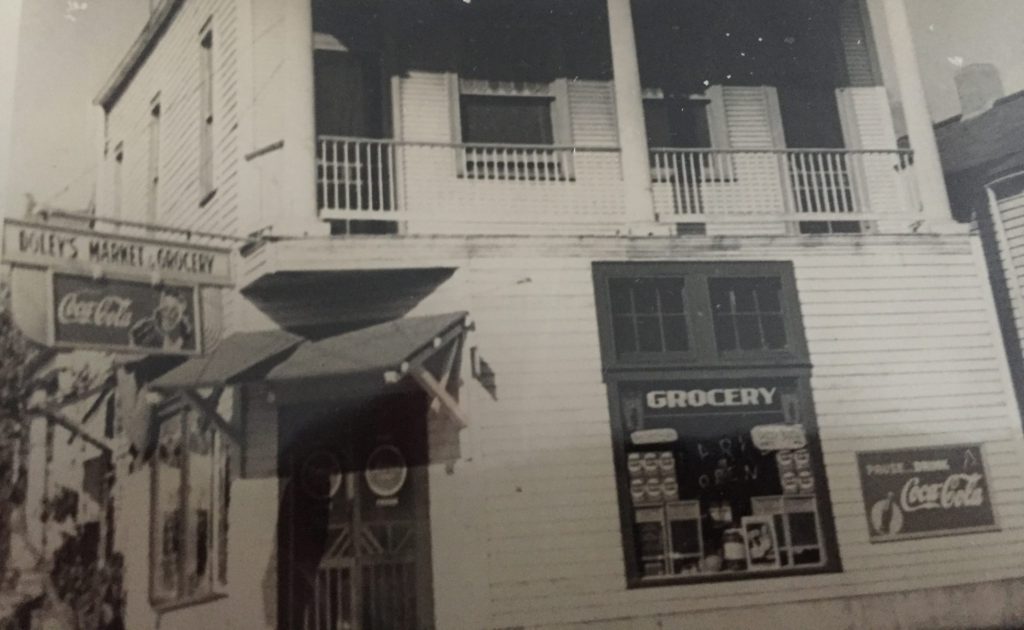
Doley’s Grocery and Market, 3751 Willow Street at General Taylor Street.
There were various wholesale grocers that were used by Doley’s Grocery and Market. The main one was the French Market, which was a farmer’s market that served as a wholesaler of fresh produce, as well as Ricca’s and Imperial Trading.
Doley’s Grocery and Market was more than just a grocery store. There were various other services offered. For instance, Mr. Doley did tax returns for his customers and provided a telephone for faster communication. He ran a small lottery operation behind the store known as “Aunt Sally’s Old Maid” Lottery. He never admitted that he was in the lottery business, and that he only rented to “Aunt Sally” who in reality was actually a man. He continued until his wife made him get out of the lottery business which at that time was illegal. She also made him get rid of the slot machine and pinball machine he had installed which also provided additional revenue.
Speaking to the familiarity of Black life during that time, even Thurgood Marshall was known to stop at the store to have a drink and engage in conversation. He did this on his trips to the city when he would stay with Daniel E. Byrd, a major figure in the local N.A.A.C.P. The Byrd family resided at 4134 Willow Street, just a few blocks from the store.
Entertainment was provided for the neighborhood children when Cisco Kid and Hopalong Cassidy visited the grocery and did a live holiday broadcast. Both cowboys were heroes of two of the most watched children’s television shows of the early 1950s. Costumed actors would visit local stores as a part of the marketing campaigns by the brands which sponsored their programs. How they loved Cisco Kid with his sidekick Poncho, as well as Hopalong Cassidy and his white horse, Topper!
To be in business, you had to be visible and Mr. Doley understood this. As a result, he became involved in various organizations. He was one of the original founders of the OPPVL (Orleans Parish Progressive Voters League) founded by Rev. A. L. Davis. He was also very active in the Young Men Illinois Club and was a member of Phi Beta Sigma Fraternity.
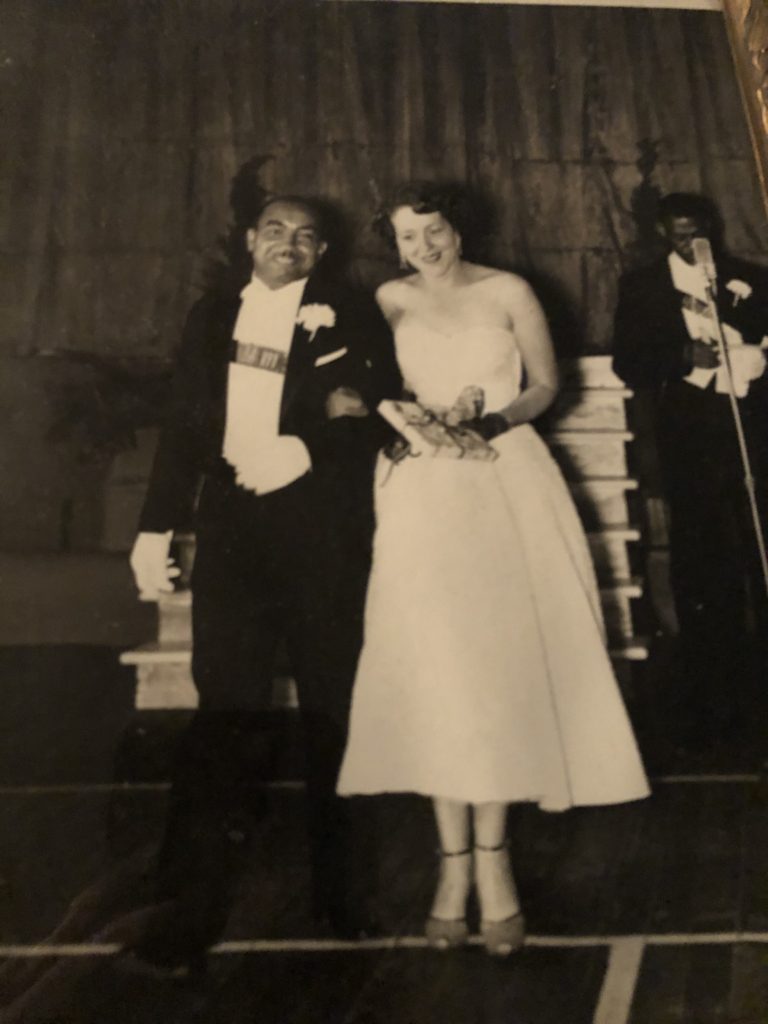
Harold Doley and Kathryn Wall Doley during YMI Ball callout.
As a board member of the Dryades Street YMCA, he succeeded in placing the Dryades Street building in his name after a fire broke out and the organization could not secure insurance. As a result, he was able to secure a policy. He joined the Zulu Social Aid and Pleasure Club in the late 1960s when there were very few members. Through the efforts of Mr. Doley and others, the club today has over 800 members and a lengthy waiting list. Harold Doley, Sr. reigned as King Zulu in 1975 and was able to reach an agreement with Mayor Schiro that allowed King Zulu to precede Rex at 9 A.M. on Mardi Gras morning; an agreement that is still upheld today.
There is a very interesting story about Zibilich Restaurant which was located one block from the grocery store on South Claiborne. The Doley family’s favorite meal was ‘oyster loaves,’ and Zibilich had the best oysters in the city. One Saturday night, Harold Doley, Sr. stopped to pick up oyster loaves and his young son Keith sat down in one of the chairs in the restaurant. The law was that blacks were served through the side window, but Harold, Sr. never went to the side window. If he wanted oyster loaves he would send people to Zibilich, but that night he stopped in to pick them up himself.
There was a large party in the restaurant and when his young son sat down, Mr. Zibilich hollered at him. There was a heated verbal exchange between the owner of the restaurant and Mr. Doley. The young boy ran to the car and told his mother that his dad was about to get into a fight. Mrs. Doley, came to retrieve her husband and the family left. Harold Doley knew that his grocery store was the economic base for the neighborhood, so he called for a boycott of Zibilich. He said to let it be known if anyone went to the side window to patronize Zibilich, they could not get credit on the books at the grocery store. Harold Sr. had realized that the profitability of Zibilich was derived from the side window, patronized by the local black community. Five months later, Zibilich Restaurant was shuttered.
One Sunday morning in 1957, The Times-Picayune had a feature article on Winn-Dixie buying a square of land on South Claiborne, five blocks from Doley’s Grocery. Mr. Doley read the article and told his wife that his business was over. He rightly observed that the new supermarket would destroy neighborhood grocery stores and markets. He decided to go back to college, obtain another degree, and become certified to teach. He worked as an assistant librarian at Xavier University and became an educator in the St. Bernard Parish School District.
Struggling to survive, Doley’s Grocery and Market continued until 1975, with it being managed by Mr. Joseph E. Brown, Mr. Doley’s stepfather. With the rise of the automobile combined with the post-war boom, a new grocery model- the supermarket emerged, leaving independent corner groceries to eke out a precious existence. As a result, only a fraction of our city’s original corner stores exists today.
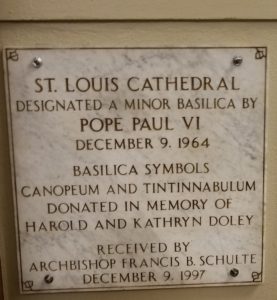
Basilica Symbols in the Cathedral-Basilica of St. Louis, King of France, donated in memory of Harold & Kathryn Doley.
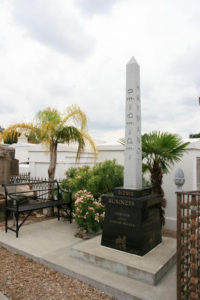
Monument to Outstanding Black New Orleanians commissioned by the Doley Family in St. Louis Cemetery No. 1.
Sources
Special thanks are due Ambassador Harold E. Doley, Jr. and the Honorable Keith A. Doley for sharing their personal recollections of their father’s career.
Obituaries: The Times-Picayune, 2 June 1973 & 8 December 1982; Article on Winn-Dixie: The Times-Picayune, 26 January 1958; Roneagle (1928) McDonogh 35 Yearbook; New Orleans City Directories (various years); Xavier University Archives Digital Collection.
Lolita Villavasso Cherrie



Very good article. Always enjoy the history of our black people. Especially Louisiana .
I enjoyed your article. While I don’t remember Doley’s Grocery, I have fond memories of the corner stores I frequented growing up in the 7th Ward. Fey’s Superette on the corner of Frenchmen and Johnson was a regular stop. Later, it changed ownership and Mr. Russ took over.
Thank you for this wonderful piece of history about our hometown.
Wow Cuz Harold,
I always had an appreciation for your family’s wonderful history. This article deepens that appreciation. Keep the dream alive,
Robert
Great Article! Hope lots of people will value this man’s journey through life.
Reading this story makes me so proud to be a Doley.
I think the town is Humbolt, Illinois rather than Humbolt county, which to my knowledge isn’t one of Illinois’ 102 counties. The ICRR travels through there regularly.
It was a surprise to see my Great Uncle’s name in the article, Edgar P. Harney.
Excellent article.
Another good read and informative article! Thanks Cuz for your sharing and caring!
I enjoyed reading about the Doley’s Grocery Store and remember hearing about those delicious oyster Poboy sandwiches. Thank you for a very interesting article.
My family moved from the Seventh Ward to Willow St about 9 blocks from Doley’s Grocery in 1948. My younger brothers and sisters knew young Harold, future Ambassador Harold, and Keith growing up. My wife Kaaren and I brought our two children from NY to DC for Harold’s swearing in by Secretary of the Interior James Watts as the founding director of the Minerals Management Service in the US Dept of the Interior in 1982. Harold and Helena live about 10 minutes from us now, and we’ve had several long talks about New Orleans, growing up there, and the world we live in today.
I learn so much from Harold every time we get together. One story that really struck me was the one about his father getting into an argument with the white restaurant owner who yelled at his young son Keith for sitting down while waiting for his father to pick up some oyster loaves. Harold Sr’s revenge was sweet and devastating. It said so much about our growing up in New Orleans at that time.
Your article added so much detail to what life was like then and the leadership role that Harold’s family played then and is still playing in New Orleans. The photos were great. Harold Jr looks like his father.
Thanks so much, CreoleGen, for making our history known.
We lived at 2722 Upperline for about 30 years or so. As a teenager one of my jobs was a State-Item delivery boy in the neighborhood. Within a radius of about 5 blocks there were at least 10 small local stores and lounges (bar rooms). One block from my house on Upperline was Porshe’s grocery. A block in the other direction around the corner was Mr. Smoot’s grocery where as a teenager you could buy cigarettes, beer, wine, and lottery tickets for my Aunt Maude, of course. The Golden Pumpkin pool hall was across the street from Mr. Smoots as was a market owned by some Italians. Miss Bernadette who lived two doors from our house raised chickens in her backyard. There was never a dull moment. Kids had hobbies and pets. Fruit trees bloomed in many backyards.
Cuz,
What you call Poche’s Grocery was Wenceslas Doley’s grocery at 2826 Upperline.
He also was a part owner of William Lawless farm
in Lafourche Parish.
As you know Uncle William’s nephew, Dr Theodore Kent Lawless was a philanthropist at Dillard and Talladega where he served as Chairman of the Board of Trustees for both.
His father Alfred was the first Black Superintendent later called Bishop of the Congreational Church.
TK also built Gentilly Gardens next to Dillard.
The complex was given to Dillard after the FHA mortgage was paid off. Lawless chapel, TK built and named it for his father.
Dr. Theodore Kenneth Lawless’ mother was the sister of my grandfather Rev. Henerson H. Dunn, the pastor of Central Congregational Church from 1906 to 1929. Cousin T. K. as family members called him advised my father to send me to attend Talladega College where I graduated with a degree in Physics. Cousin T.K. and my father shared photography as a hobby.and showed each other pictures. Cousin T.K. had a brother Oscar Lawless who taught mathematios at a college in Austin, TX. He stayed with us when he visited New Orleans. He had a daughter from Long Island, NY that also would visit. Cousin T.K. would stay with Dr. Albert Dent and Mrs. Dent. Dr. Dent was the president of Dillard University, Mrs. Dent was an accompliced classical pianist and member of the B-Sharp Music Club.
As always most informative article. Thank you. So much history.
Great information. Mr. Doley was King Zulu in 1975 and is credited with creating a Zulu King Flag Raising ceremony. He was also known for his leadership in Zulu as well as the community. l
CreoleGen’s article of December 13, 2021,” Doley’s Grocery,” brought back complex memories and significant parallels of that era and of the Doley family. Our families were friendly for two generations. We grew up in the same neighborhood. Harold and my brother Michael Starks were best friends, so it was not uncommon for Harold and his devilish brother Keith to visit our house every day. Harold and Michael served as Best Man in each other’s weddings
My mother attended McDonogh # 35 at the time Harold, Sr. also attended McDonogh #35. In fact, I think they went on at least one date together. They remained friends and when each married, the families became friends.
Although I have no memory of it, I was told that Thurgood Marshall came to our house to play poker with my father and other men when he was in town. And, like the Doleys, my father ordered oyster loaves from Zibilich’s for our family every Friday night. Zibilich must have been aware of how much the black community in that Uptown neighborhood valued their delicious oyster loaves as they hired a black man on a bicycle to deliver piping hot loaves to the homes of families like mine who did not walk the few blocks and suffer the indignity of standing by the side window to be served. So, when the Doley’s called for a boycott, our family complied, and my father upgraded a notch and ordered stuffed lobsters from T. Pittari’s Restaurant. It too was delivered to our house, hot and delicious, a testament to the value and the threat of the black family during these strange times. Businesses of that era spent more money to keep black people out of their establishments than it costs them to serve their other clientele.
Another factor, seldom noted by historians and journalists, the Doleys’ protest of Zibilich for this egregious disrespect of his family, was symbolic of the New Orleans Black citizens’ reaction to racial mistreatment. While most complied with institutional racism without a whimper, they did not allow disrespect of their children or their families.
Jari Honora has traced both my parents’ ancestry. My Grandfather, Adam Doley, has been identified as a Mayflower descendant based upon DNA as well as historical, legal, and ecclesiastical records. My Grandfather, Adam D’Jalma Doley’s mother, Laura Doley, was born free in Convent, LA, as was her mother. This is reflected in baptismal records. Adam’s father’s line were coopers, these were carpenters and more specifically, makers of barrels. Under the Spanish Rule of Louisiana (mid-1700s), enslaved people could buy their freedom and they could work for money on their own time. Adam’s grandfather bought his freedom and the freedoms of his wife and children in the mid-1800s and they owned a farm that was on River Road in Convent, St. James Parish, LA. A portion of that property remained in the family until the 1960s. The lineage was spelled out in great detail in the New England Historical & Genealogical Society’s journal Mayflower Descendant. This publication marked the 400th Anniversary of the Landing of the Mayflower at Plymouth Rock, which was observed on Thanksgiving 2020. As far as can be determined, my freed progenitors did not own slaves because they had a large family, the family members worked the farm. When the Doleys married into the Perkins Family they combined their farms for a larger operation.
Regarding a social media comment on Wenceslas Doley, from what I know of him he was a great man. He was a pullman porter on the Illinois Central Railroad between New Orleans and Chicago, like his brother Adam (my grandfather). Wenceslas was called “Dude” by everyone and later became known as “Uncle Dude”. He made cash money during the Depression. Many of his cousins were tradesmen, bricklayers, carpenters, etc. He would buy vacant lots in his neighborhood and have relatives build rental property on these acquisitions. He would pay all these cousins/tradesmen primarily with food from his grocery store at 2826 Upperline. Many of his relatives were educated such as Professor Eugene A. Doley, who is listed as one of three notable alums of Leland College. He headed a school in Cuero, Texas and it was named for him while he served as its Headmaster.
Brothers Wenceslas and Adam said that they could make more money working on the trains than teaching school. When Wenceslas Doley died his estate was valued at more than $250k (in 1950 dollar terms).
The Illinois Club was founded by Wiley Knight at the home of Erona Doley in 1894, primarily by men and women that had an affiliation with the Illinois Central Railroad, these were not people from Illinois but employees of the ICRR.
Because of Harold Sr.’s work at Dryades YMCA, he was honored by the International YMCA at an event with Gov. David C. Treen as keynote speaker.
Harold Doley